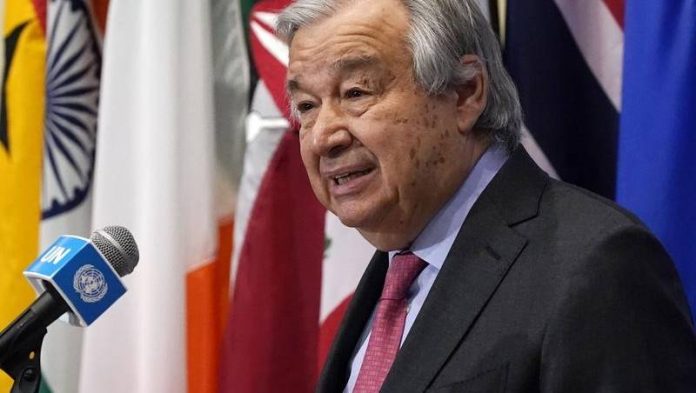The United Nations secretary-general says Australia and other countries intent on increasing fossil fuel production are dangerous radicals.
Antonio Guterres made the comment while launching a new global climate change report urging the world to hit the accelerator on the transition to renewable energy.
The Intergovernmental Panel on Climate Change (IPCC) report, released on Tuesday, says it’s still possible to meet the objectives of the Paris climate pact to limit global warming to well below 2C, preferably to 1.5C.
It sets out viable, financially sound options to keep the 1.5C goal alive, with Guterres saying the pace of transition to renewables needs to triple.
“We are on a pathway to global warming of more than double the 1.5-degree limit agreed in Paris. Some government and business leaders are saying one thing – but doing another. Simply put, they are lying,” he said.
He said climate activists were sometimes depicted as dangerous radicals “but the truly dangerous radicals are the countries that are increasing the production of fossil fuels”.
Frank Jotzo is a professor of climate change economics at the Australian National University (ANU) and a lead author on the report, which focuses on what must be done globally to avert the worst consequences of climate change.
He said Australia had a patchwork of climate policies that only covered a small part of the economy – nothing like the wholistic approach the report said was needed to be effective.
“In addition, the level of ambition in the few climate policy instruments that are in operation is very weak, compared to what is needed to be on a trajectory compatible with a 2C outcome,” he said.
He said there was little in place to encourage the transport sector to move away from fossil fuels, building codes were lax on energy efficiency, and the federal government’s safeguard mechanism, meant to apply enforceable emissions baselines for heavy emitters, was ineffective.
“There is no effective incentive to reduce emissions because baselines are set so high that most companies are below them anyway, without having to do anything.”
Peter Newman is a professor of sustainability from Curtin University and a co-author of the IPCC report, with a focus on transport.
He said Australia and other countries intent on supporting fossil fuel industries were trying to subvert the market-led transition to renewables.
“And that is really silly. Even in countries that politically are considered hold-outs or laggards we are seeing this kind of market-led transformation,” he said.
The report details the dramatic drop in the affordability of renewable power since 2010: solar is down 87 per cent, wind, 55 percent, and batteries 85 per cent.
“We now have a cost effective set of solutions that can provide dramatic reductions. An exponential decline in fossil fuels is now on the cards because they are market ready, they are cost effective,” he said.
“We can make the changes now, working with the economy, and not against it. That’s a dramatic shift in what we are seeing in this IPCC report.”
Prime Minister Scott Morrison went to a major climate summit in Glasgow last year without the two big things countries were asked for: stronger 2030 emissions reduction targets, and a rapid phase out of coal.
Morrison’s plan to achieve net zero emissions by 2050 relies on a technology-led economic evolution to cut emissions, capture and store them, or offset them, while allowing coal and gas exports to continue as long as there is demand.
New coal mining projects continue to be approved, along with gas developments.
SOURCE: AAP/PACNEWS













